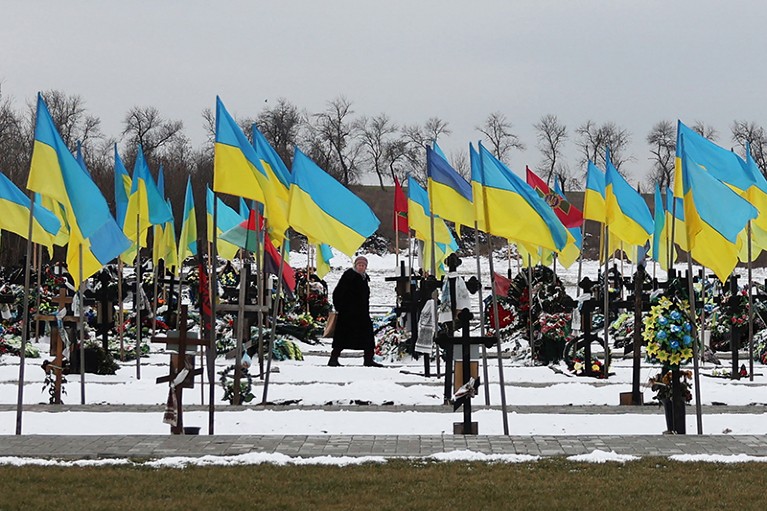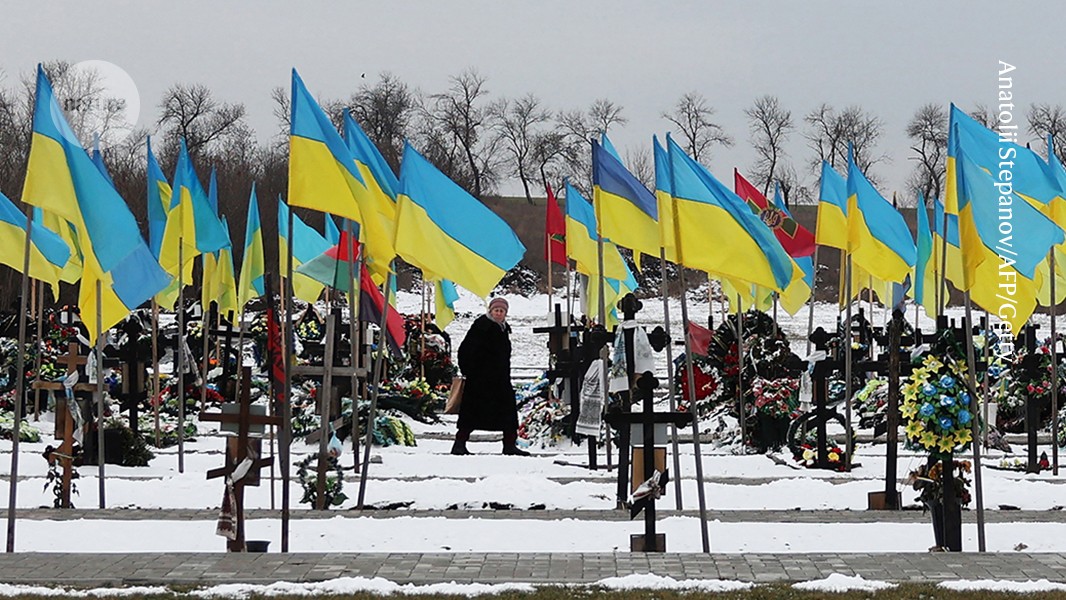
Several Russian researchers are navigating academic rejection after the invasion of Ukraine.Credit: Anatolii Stepanov/AFP/Getty
After Russia’s invasion of Ukraine in 2022, Russian expatriate researchers and students living in the West had a judgement call to make — should they publicly condemn the war (as many of them did) and risk repercussions for their families back home? Or should they stay silent and risk seeming as if they condone Russia’s invasion?
Now, long after making that decision, some Russian students and junior researchers are thinking hard about whether they can maintain their careers abroad amid anti-Russian sentiment and the effect of government sanctions.
Two years ago, Alisa Iakupova claimed that one of her friends was rejected from the Beatson Institute for Cancer Research in Glasgow, UK, because she was Russian. Her post about it on Twitter (now X), which has now been deleted, went viral. At the time, the institute, which is now called the Cancer Research UK Scotland Institute, said that there had been an initial misunderstanding and apologized for any distress caused. It offered the rejected student a place, but they declined and went to study at the Medical University of Vienna instead. “I decided to try and help other people in this situation,” says Iakupova, a PhD student at the Max Delbrück Center for Molecular Medicine in Berlin.
Since then, she and a few other Russian researchers in Europe have been running an informal community support group, made up of about 40 volunteers, on the messenger tools WhatsApp and Telegram to help Russian researchers navigate similar academic rejections.
Some of the volunteers have spoken to university administrators to get more information about the reasons for the rejections and others have been engaging with journalists and the media to increase awareness of the issue.
Iakupova, who is originally from Ulyanovsk, which is roughly a 13-hour train ride from Moscow — isn’t oblivious. She knows that Ukrainian researchers have had it worse than their Russian counterparts and many people told her so on Twitter. “That’s why I feel bad complaining about these rejections,” she says (see ‘Danger and disruption’).
There isn’t much to be gained from limiting the careers of individual Russian scientists, argues Alexander Kabanov, director of the Center for Nanotechnology in Drug Delivery at the University of North Carolina at Chapel Hill. Kabanov, who is also treasurer and chief executive of the Russian–American Science Association, adds: “Everyone realizes the invasion was a tragedy for Ukraine and for science, but people are quite concerned about what is going on and are aware that individual Russians shouldn’t be blamed.”
Anastasiia Budaeva sent PhD applications to two laboratories at the University of Helsinki in March 2023, but she was declined by both. “The two refusals were based on the fact that I am from Russia,” she says.
Budaeva kept screenshots of the rejection e-mails and the reasons for refusal are clear. “Your CV is interesting in the context of our projects and under different circumstances, I could see you certainly as a good candidate for a PhD within our group,” reads one seen by Nature’s careers editors. It continues: “However, I am afraid that while the brutal invasion and senseless bombing and killing carried out by the government of your country, willing countrymen as well as private military bandits, this will not be a viable option for you, as we currently cannot hire Russian nationals still residing in Russia at this point, if only because you would not be able to get a visa to Finland.” The e-mail concludes by encouraging her to get back in touch “once Russia leaves Ukraine and peace is restored”.
Hiring in science
The confusion around admitting Russian citizens has since been clarified, says Robert Luxenhofer, a chemist at the University of Helsinki. “There was indeed a period of uncertainty shortly after the war began,” he adds. “During that time, I was advised by a senior colleague that we might not want to accept Russian nationals residing in Russia due to evolving sanctions and restrictions. Regrettably, this advice was based on a misunderstanding and was incorrect. The university continues to enrol Russian doctoral candidates.”
The clarification didn’t come in time for Budaeva, who is now a PhD student at the Polytechnic University of Turin in Italy.
It was a similar story for Tatiana — an alias to protect her real identity amid fears of repercussions — who was studying for a master’s degree in molecular and cell biology at Vrije Universiteit Brussel in 2023. She decided to apply for an internship at the Grenoble Alpes University in France to bolster her CV in preparation for applying to do a PhD. But she was told by the internship coordinator, who is himself a Russian citizen, that he could not consider her for the position because of the war in Ukraine. Neither he nor the university replied to several requests from Nature’s careers team for comment.
Kabanov hasn’t heard of rejections based on nationality in the United States. “This is a European problem in my opinion. I haven’t seen any of this whatsoever in American academia,” he says. But it can be hard to get Russian scientists through the immigration system. “When we want to recruit someone from Russia, it’s very difficult to get a visa,” he adds.
Exit strategies
For Russians who are still living in Russia, finding a position abroad can be more than just a career move — it’s also a way to avoid being drafted into the fight against Ukraine. Dimitri — also an alias — opposes the war in Ukraine. The 22-year-old finished his computer-science bachelor’s degree in Moscow this year and feared that he could be forced into the army. He applied to the Swiss Federal Institute of Technology in Zurich (ETH Zurich) to study for a master’s degree in data science.
“There are two reasons why I considered leaving,” he explains. “The first was a matter of justice and a violation of rights that we see here with our politicians and just regular people. The second reason was that there’s a huge migration of knowledge and talent from Russia to other countries and so it’s harder to develop something big in research here.”
In March, Dimitri received a letter from the head of admissions at ETH Zurich that said that the university wouldn’t accept his application. It explained that the university foresaw a threat that he might return to Russia and end up helping the Russian war effort with the knowledge that he would acquire from earning a master’s degree at the university.
Want a new job in science? Six charts to help you land it
“Switzerland has legal regulations in force that prohibit the transfer of knowledge about certain goods with properties for civil and military use (dual use) to the Russian Federation,” reads the rejection letter. “There is a risk that this knowledge will be transferred to the Russian Federation during the master’s programme. In order to ensure compliance with Swiss legal regulations, admission can therefore not be granted.”
Dimitri isn’t the only one who received such a letter. Georgiy — also not his real name — who graduated from Moscow Institute of Physics and Technology, applied to ETH Zurich this year to study for a master’s degree in quantum engineering. He received a rejection letter with almost identical wording to the one sent to Dimitri. “I’m not a Russian spy or anything,” he says. “I’m just a normal student who wants to pursue a high level of education at one of Europe’s best technical universities.” Georgiy also casts doubt on the risk of transferring knowledge cited by ETH Zurich, arguing that a master’s student at a university in Europe cannot learn something so critical that senior scientists back in Russia don’t already know, he says.
Dimitri found the forthrightness of the rejection refreshing. “There are a lot of cases where you’re just rejected without any explanation,” he says. “I think the really interesting part about ETH Zurich’s rejections is that they so clearly state their reason.”
A spokesperson for ETH Zurich denied that the university was making admissions decisions on the basis of citizenship alone, telling Nature’s careers team in an e-mail that it is instead guided by the specific subject area that an applicant wants to study and the extent to which they remain connected with Russia.
Dimitri and Georgiy also applied to the Swiss Federal Institute of Technology in Lausanne (EPFL). Both got in and are now studying for their master’s degrees.
“There’s a flaw to the logic, because EPFL is pretty comfortable accepting Russian students,” says Dimitri, raising the question of whether ETH Zurich is being particularly hard line in its interpretation of Swiss law or whether EPFL isn’t enforcing it sufficiently. “I strongly disbelieve the position that EPFL is breaking the law because I applied for a visa to go there, and it was reviewed by official government representatives and I was allowed to enter Switzerland,” says Dimitri.
When pressed on the question of how an applicant can be rejected from one Swiss institution but accepted by another, a spokesperson for ETH Zurich replied: “As a technical university with a lot of patents and inventions, ETH might be affected more strongly by the Swiss export control regulations and sanctions than other schools.” The university published guidance on sanctions and security screening last month.




